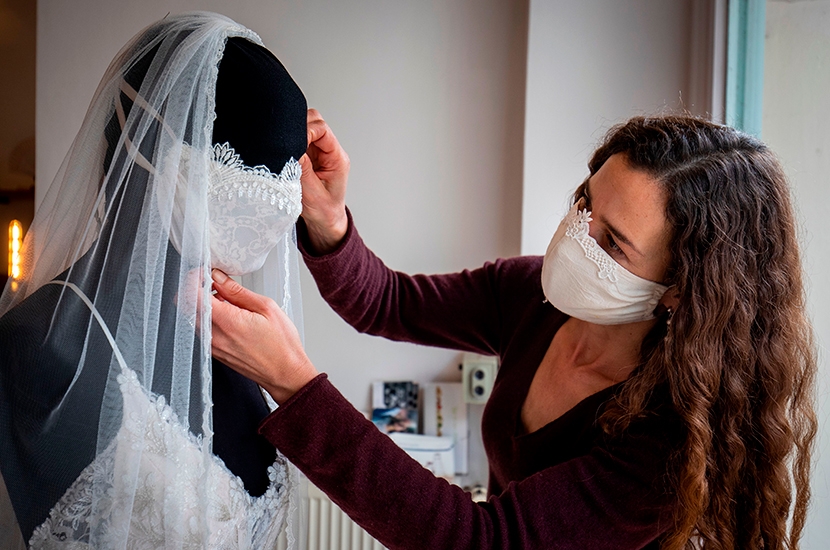I had planned to spend this Saturday in a large white dress, sipping rosé and cutting into a three-tier rhubarb pavlova. Instead, I’ll be drinking gin on my sofa as family members dial in to offer commiserations to me and my fiancé.
I am a COVID bride — one of the many whose weddings have been put on hold because of the lockdown. While the pandemic has had devastating and irreversible effects on people’s lives, it has also left many engaged couples with nowhere to go.
In our case, the marriage license application had been sent, the father of the groom’s slideshow completed, bridesmaids’ dresses finally agreed on (this may have been the hardest bit of all) and the table plan was under way. I’d begun to boast that wedding planning was easy. Then along came a global pandemic and knocked everything off course.
In February there were early warning signs my date could be at risk. Friends would make teasing jokes (‘I hope you have wedding insurance!’ — I didn’t). But as the news from Italy worsened and the number of confirmed COVID-19 cases in the UK increased, the inevitable became clear. Nervous colleagues avoided saying the W-word around me for fear of a volatile response. The editor poured wine.
While I was disheartened, a general air of defiance hung around my other engaged friends. They messaged guests to explain that they planned to press on. Their weddings were in the summer, so there was nothing to worry about. Brides such as I, who had gone for spring dates, seemed like the unfortunate ones. But over time, the picture changed.
Now it looks as if we spring brides were lucky. We’ve been given a competitive advantage. With no choice but to postpone, we have a head start on vacant dates. After I rebuffed my comparatively relaxed fiancé’s suggestion of just heading quickly to the registry office, we managed to move our date to next summer with relative ease, transferring bookings and deposits. Re-arranging the honeymoon was a bit messier — for reasons too complicated to explain, I’m now going to the Hebrides twice.
Other brides face a much tougher situation than I did. UK chief medical officer Chris Whitty has said we can expect some social distancing to continue for the calendar year. As churches remain shut, the odds don’t look good for a big white wedding in the summer. Even if there is an easing of lockdown restrictions in a few weeks’ time, it’s unlikely to allow all the components that have come to be seen as customary to a wedding: the presence of elderly relatives and international guests, a cut and color, or simply people dining with friends outside of their household.
Stranded brides find themselves holed up in their apartments with long hours to consider what could have been — and to unleash their inner bridezilla over what comes next. Online wedding forums are filled with June, July and August brides attempting to analyze government lockdown messages for hints as to whether it would be better to stick to the original plan and pray for a miracle or to scramble for a new date. Most couples who choose to scramble have already paid significant deposits, so the most viable option is to stick with the original venue and postpone the date. Those venues that refuse to play ball are quickly shamed on social media.
But even if they are merciful, there’s a mounting problem for couples who hope to delay: supply and demand. There are not enough weekends in 2021 to find room for all of this year’s postponed weddings alongside those that would have been taking place anyway. Hamish Shephard, of the UK wedding planning app Bridebook, says he expects to see a trend towards more weekday and winter weddings as COVID brides find themselves at the back of the line.
Still, there are silver linings. Another year means more time to plan. I’m spending a considerable amount of time looking at peonies online. I hear of other brides using lockdown as an opportunity to add personalized touches to goods already purchased, and with new collections of bridalwear to pore over before big days actually arrive, online influencers and the indecently rich could turn multiple wedding dresses into a trend.
The backlog in the current race for dates means any couples considering a wedding proposal in lockdown had better be prepared for a long engagement. This is already on one friend’s mind. He’s keen to propose in the near future, but lockdown presents several obstacles. Firstly, jewelers are closed. Secondly, ‘it’s hard to pick a romantic moment when you are stuck in a small flat all day’.
But with little clarity on what social distancing will mean in the long-term — and with experts warning that finding a vaccine could take years — coronavirus could lead to a rethink of our approach to weddings. In New York, couples are already getting creative. Gov. Andrew Cuomo has signed an executive order allowing couples to get married by video link — with marriage licenses available online and clerks to officiate remotely. Zoom weddings are now the order of the day, allowing family members of all ages and around the world to join from a safe distance.
Should that fail to catch on, there is one other reason to think the 2021 wedding stampede might not be as full-on as the current numbers suggest. Confined indefinitely with no one but their beloved for company, couples face a relationship stress test. Survival of the fittest may yet fix the problem.
This article was originally published in
The Spectator’s UK magazine. Subscribe to the US edition here.


















